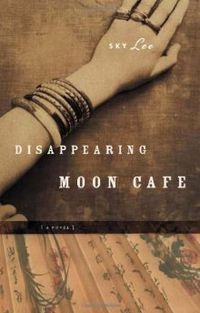Sky Lee: Difference between revisions
No edit summary |
No edit summary |
||
| Line 7: | Line 7: | ||
|Aspects=Moderator | |Aspects=Moderator | ||
}} | }} | ||
Sky Lee (born September 15, 1952 in Port Alberni, British Columbia) is a Canadian artist and novelist. Lee has published both feminist fiction and non-fiction and identifies as lesbian. | |||
==Personal life== | ==Personal life== | ||
Moving to | |||
Moving to Vancouver in 1967 to attend university, she received a B.A. in Fine Arts at the University of British Columbia and a Diploma in Nursing from Douglas College. She became a member of the [http://asiancanadianwiki.org/wiki/Jim_Wong_Chu Asian Canadian Writers Workshop]. Lee lives on Saltspring Island, British Columbia. | |||
==Career== | ==Career== | ||
Lee's first book, | Lee was first published as the illustrator of 1983's children's book, Teach Me to Fly, Skyfighter! by Paul Yee. The book is a collection of four stories exploring what it is like to grow up as a Chinese-Canadian in a community with links to both Asian-Canadian and Anglo-Canadian cultures. Reviewer Robert W. Bruinsma argued the book was "modestly illustrated." | ||
Lee's first book, Disappearing Moon Cafe, published in 1990, explores the Wong family over four generations, as they operate the titled cafe. Nominated for the Ethel Wilson Fiction Prize and the Governor General's Award, the novel won the City of Vancouver Book Award despite some critics charging that the writing was over-earnest. For example, critic Gary Draper wrote, "Hardly a noun walks free of a trail of adjectives." | |||
In the same year, Lee contributed to the collective prose, | In the same year, Lee contributed to the collective prose, Telling It: Women and Language Across Culture. The book's writing is attributed to the "Telling It Book Collective", of which Lee was a member. The book explores issues of racism and homophobia experienced by native, lesbian and Asian Canadian women. | ||
In 1994, Lee published | In 1994, Lee published Bellydancer: Stories, a collection of 15 short stories that explore a range of feminist themes, with allegories focusing primarily on the "bellydancer," an archetype of survival. The back cover of the book explains: "bellydancing was originally performed at the bedside of women in labor, as an erotic dance of creation." | ||
Her short stories have also appeared in | Her short stories have also appeared in Vancouver Short Stories as well as periodicals such as West Coast Line, [http://asianadian.blogspot.ca/ The Asianadian], Kinethis, and Makara. | ||
==Bibliography== | ==Bibliography== | ||
* | * Teach Me to Fly, Skyfighter!: And Other Stories (as illustrator, text by Paul Yee) - 1983 | ||
* | * Disappearing Moon Cafe - 1990 | ||
* | * Telling It: Women and Language Across Cultures - 1990 (with Betsy Warland, Lee Maracle and Daphne Marlatt) Press Gang Publishers | ||
* | * Bellydancer: Stories - 1994 | ||
Latest revision as of 02:14, 29 June 2012
Vancouver 49° 15' 39.14" N, 123° 6' 50.23" W Arts Person Moderator
Sky Lee (born September 15, 1952 in Port Alberni, British Columbia) is a Canadian artist and novelist. Lee has published both feminist fiction and non-fiction and identifies as lesbian.
Personal life[edit]
Moving to Vancouver in 1967 to attend university, she received a B.A. in Fine Arts at the University of British Columbia and a Diploma in Nursing from Douglas College. She became a member of the Asian Canadian Writers Workshop. Lee lives on Saltspring Island, British Columbia.
Career[edit]
Lee was first published as the illustrator of 1983's children's book, Teach Me to Fly, Skyfighter! by Paul Yee. The book is a collection of four stories exploring what it is like to grow up as a Chinese-Canadian in a community with links to both Asian-Canadian and Anglo-Canadian cultures. Reviewer Robert W. Bruinsma argued the book was "modestly illustrated."
Lee's first book, Disappearing Moon Cafe, published in 1990, explores the Wong family over four generations, as they operate the titled cafe. Nominated for the Ethel Wilson Fiction Prize and the Governor General's Award, the novel won the City of Vancouver Book Award despite some critics charging that the writing was over-earnest. For example, critic Gary Draper wrote, "Hardly a noun walks free of a trail of adjectives."
In the same year, Lee contributed to the collective prose, Telling It: Women and Language Across Culture. The book's writing is attributed to the "Telling It Book Collective", of which Lee was a member. The book explores issues of racism and homophobia experienced by native, lesbian and Asian Canadian women.
In 1994, Lee published Bellydancer: Stories, a collection of 15 short stories that explore a range of feminist themes, with allegories focusing primarily on the "bellydancer," an archetype of survival. The back cover of the book explains: "bellydancing was originally performed at the bedside of women in labor, as an erotic dance of creation."
Her short stories have also appeared in Vancouver Short Stories as well as periodicals such as West Coast Line, The Asianadian, Kinethis, and Makara.
Bibliography[edit]
- Teach Me to Fly, Skyfighter!: And Other Stories (as illustrator, text by Paul Yee) - 1983
- Disappearing Moon Cafe - 1990
- Telling It: Women and Language Across Cultures - 1990 (with Betsy Warland, Lee Maracle and Daphne Marlatt) Press Gang Publishers
- Bellydancer: Stories - 1994
